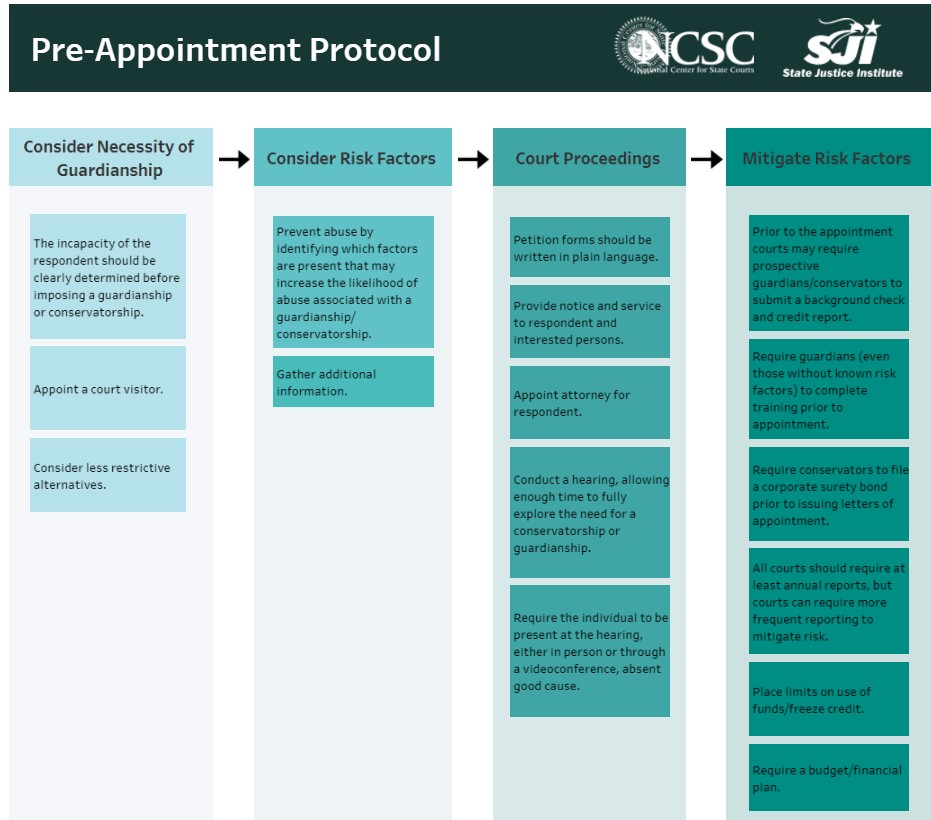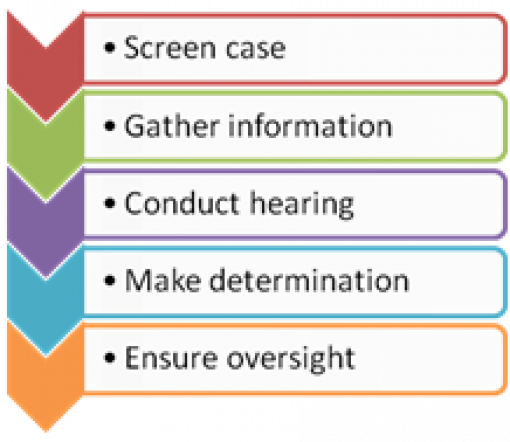The establishment of guardianships will differ to some extent based on state laws and local court procedures. However, the process involves some common steps, including a petition to initiate a court proceeding and a hearing to determine capacity levels and the need for a guardianship or conservatorship. The National Probate Court Standards is an excellent guide on the guardianship and conservatorship processes from petition to final report and discharge.
Petition
The Standards recommend that a petition to establish a guardianship or conservatorship include the following information:
- The reasons why a guardianship or conservatorship is being sought.
- A description of the nature and extent of the limitations in the respondent's ability to care for herself/himself or to manage her or his financial affairs.
- Representations that less intrusive alternatives to guardianship or conservatorship have been examined.
- The guardianship/conservatorship powers being requested and the duration of the powers.
- The nature and estimated value of assets, the real and personal property included in the estate and the estimated annual income (conservatorship cases).
Following the submission of a petition, the establishment of a guardianship or conservatorship generally involves the following steps, though variances will occur from court to court.


Resources
Pre-Appointment Protocol
This protocol lists the responses and steps judicial officers and the court should take before appointing a new guardian or conservator (click to enlarge).
See below for more information and detail on the individual considerations.
The Uniform Guardianship and Protective Proceedings Act (UGPPA 1997) uses the following standard for the appointment of an emergency guardian: Substantial harm to respondent's health, safety, or welfare and no other person appears to have authority and willingness to act (§ 312). The Act requires that a petition be filed with the court, notice to respondent be given (unless the respondent will be substantially harmed before a hearing can be held), the respondent has a right to counsel and presence at the hearing and that the emergency guardian's authority not exceed 60 days. The Uniform Law Commission tracks the status of the Act for each state—to date, only a handful of states have enacted the Act in full.
The National Probate Court Standards (Standard 3.3.6) recommends courts to only appoint a temporary guardian or conservator ex parte:
- Upon the showing of an emergency;
- In connection with the filing of a petition for a permanent guardianship or conservatorship;
- Where the petition is set for hearing on the proposed permanent guardianship or conservatorship on an expedited basis; and
- When notice of the temporary appointment is promptly provided to the respondent.
The Standards support an expeditious hearing, the use of a protective order in lieu of a temporary guardian or conservator appointment where appropriate and specific limited powers that expire after 30 days. When the temporary appointment is established, the date for the hearing on the proposed permanent guardianship or conservatorship should be scheduled, at which time the temporary appointment will lapse. In temporary conservatorship cases, full bonding of liquid assets should be required to protect the financial well-being of the protected person.
Resources
The incapacity of the respondent should be clearly determined before imposing a guardianship or conservatorship.
The establishment of a guardianship or conservatorship is predicated on the determination of incapacity. Legal definitions of incapacity vary from state to state. The Uniform Guardianship and Protective Proceedings Act (UGPPA 1997) uses a definition of an "incapacitated person" to describe an individual who lacks the ability to "receive and evaluate information or to make or communicate decisions to the point that the person's ability to care for his or her health, safety or self is compromised" (§ 102(5)). The definition emphasizes the importance of a functional assessment and underscores the fact that capacity fluctuates from situation to situation.
The National Probate Court Standards (Standard 3.3.9) call on the imposition of a guardianship or conservatorship:
"to be based on clear and convincing evidence of the incapacity of the respondent and that a guardianship or conservatorship is necessary to protect the respondent's well-being or property. The court may require evidence from professionals or experts whose training and expertise may assist in the assessment of the physical and mental condition of the respondent."
The evidence should be used to consider whether a less restrictive alternative might be more appropriate.
Capacity is multifaceted. For instance, a mental illness diagnosis does not dictate whether an individual has legal capacity. Capacity can potentially be enhanced with education, training, rehabilitation, treatment, therapy, community services and assistive devices. For this reason, the Standards recommend that court reports prepared by professionals and experts include an appraisal of the functional limitations of the respondent.
The American Bar Association and the American Psychological Association, in partnership with the National College of Probate Judges, published the Judicial Determination of Capacity of Older Adults in Guardianship Proceedings. The handbook discusses six pillars of capacity:
- Medical condition
- Cognition
- Everyday functioning
- Values and preferences
- Risk and level of supervision
- Means to enhance capacity
The steps to determining capacity are outlined in the graphic.
Capacity instrument examples:
- ABA. APA, NCPJ: Judicial Determination of Capacity of Older Adults. A Handbook For Judges
- North Carolina: Guardianship Capacity Questionnaire
- Maryland: Physician's Certificate
- Kansas: Decision-Making Functional Assessment: Criteria for Legal Impairment - A Multi-Disciplinary Tool
- California: Needs assessment in Chapter 6-5 of California Handbook for Conservators
- California: Capacity Declaration - Conservatorship Form
See our capacity section (link under Aging/Key Legal Issues section) for more information.
Inappropriate guardianships/conservatorships may easily result from capacity evaluations that lack thoroughness and disregard the procedural protections highlighted in the tab below. Consider the story of Mary Jane Mann, who was the victim of an inappropriate, predatory guardianship (conservatorship) in California.
Resources
- Elder Justice Navigator Project: Elder Abuse Desk Guide for Judges and Court Staff from the Center for Elder Law and Justice
- Elder Justice Initiative website
- National Probate Court Standards
- State statutes on capacity definitions and initiation of guardianship proceedings (ABA, 2020)
- State statutes on conduct and findings on guardianship proceedings (ABA, 2020)
Procedural protections are critical in guardianship cases. The Uniform Guardianship, Conservatorship and other Protective Arrangements Act by the Uniform Law Commission to update procedures for appointing guardians and conservators strengthen due process protections for persons who are the subject of guardianship proceedings.
The National Academy of Elder Law Attorneys (NAELA), in their public policy guidelines, supports the following aspects of procedural due process concerning adult guardianship: Timely notice in plain language, including information about the rights that are subject to being lost and the individual's rights at the hearing;
- Requirement for the individual to be present at the hearing unless there is good cause and provisions for hearing accommodations;
- Mandatory court appointment of counsel at or before notice to act as zealous advocate for the individual and court payment of fees for indigent respondents; and
- Hearing rights including right to compel attendance of witnesses, cross-examine, request a jury trial and appeal the decision.
Provide timely notice
Provide timely notice and service to the respondent and interested persons.
Appoint an attorney for the respondent
Both the National Probate Court Standards (Standard 3.3.5) and the Uniform Guardianship, Conservatorship and Other Protective Arrangements Act (UGCOPAA 2017) address representation. A court shall appoint a lawyer to represent the respondent in a protective proceeding if at least one of the following conditions exist:
- The respondent requests an attorney.
- The court visitor recommends the appointment of an attorney.
- The court determines that the respondent needs representation (§ 305(b)).
- Representation is required by law.
The Standards indicate that the role of the counsel is that of an advocate for the respondent. The counsel should consider the respondent's prior directions and expressed desires and opinions, if known. In cases where the respondent's position is not known, the counsel should request the court to consider appointment of a Guardian ad litem to represent the respondent's best interest.
Include a court visitor
In Uniform Probate Code jurisdictions, the court may appoint a person (visitor) to monitor and report on the condition of the protected person. Visitors typically are trained volunteers.
Utah's Ad Hoc Committee on Probate Law and Procedure recommendation:
“Consider in every case ordering that the respondent be evaluated by a physician or psychiatrist and by a court visitor. Adopt uniform forms on which to report the results of a clinical and social evaluation” (P.4)
Resources
Allow enough time
Conduct a thorough hearing, allowing enough time to fully explore the need for a guardianship or conservatorship.
Ensure a person-centered hearing
Ensure that the hearing is person-centered and not court-centered, keeping in mind that elderly respondents may need audio and visual aids.
Consider the examples of specifically designed Elder Protection Courts and Elder Justice Centers, such as the following:
- The 13th Judicial Circuit Elder Justice Center (EJC) Tampa, Florida, is a court program designed to assist persons aged sixty or older who are involved in the court system
- The California Superior Court, County of Ventura Elder Law Court is a dedicated calendar consolidating all elder abuse cases in one courtroom.
Promote hearing attendance
Ensure full access and participation by older persons by considering the following:
- Make court welcoming and accessible with clear signage and directions.
- Time certain calendaring will reduce stress for respondents.
- Alternative scheduling: This includes considering what time of day is typically the best for the respondent (e.g. considering “sundowning”). Also, consider the time required for the respondent to fully understand and participate in the hearing.
- Have an interpreter available if one is necessary.
- Consider the best option for the respondent to participate: in-person, by video conference, or by telephone.
During the hearing:
- Explain the purpose of the hearing and what participants can expect in plain language.
- State everyone’s name and role in the hearing.
- Maintain procedural justice principles, including voice, respect, understanding and neutrality.
- Understand how to communicate effectively with people with dementia.
- Use the Judicial Guardianship Evaluation Worksheet (PDF) to help ensure that all critical issues are addressed in the hearing. A webinar and presentation slides (PDF) are available for more information.
Maintain procedural fairness during remote hearings
As the use of technology for court appearances will likely continue after the COVID-19 pandemic, it is important to consider how interpersonal communication in a remote platform differs from the in-person experience. The National Center for State Courts offers practical tips via the following resources:
Conducting Fair and Just Remote Hearings: A Bench Guide for Judges
Remote Hearings and Access to Justice During COVID-19 and Beyond






